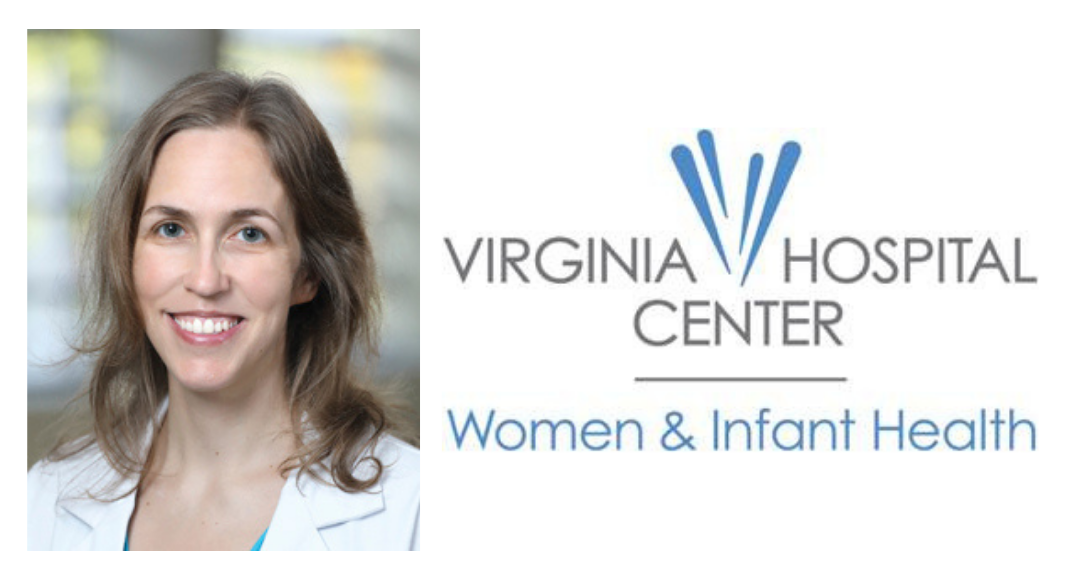Have questions about fertility? We have answers from Dr. Amanda Rohn, MD, FACOG who is an OB/GYN physician and Medical Director of the Virginia Hospital Center Physician Group Outpatient OB/GYN Practices. In part one of our interview with Dr. Rohn, we asked her our reader’s top questions on miscarriage. In this conversation, we discuss the path to pregnancy and our reader’s top fertility questions.
Dr. Rohn provides gynecologic and obstetric care to patients in the DMV region at Virginia Hospital Center’s Arlington, VA location. Her philosophy emphasizes collaborative decision-making between patients and providers, evidence-based care, and recognition that more medical treatment is not always better.
How common is it to experience fertility issues?
About 15% of women in general experience fertility issues, but that goes up to around 50% as women near age 40. While age isn’t the end-all-be-all, it’s the most important factor to consider, since we all experience aging! Fertility can also be decreased by underlying medical conditions including obesity, diabetes, or thyroid problems, as well as lifestyle factors including smoking, excessive alcohol intake, and marijuana use.
How long before I try and conceive should I remove my IUD, or stop taking hormonal birth control?
You can potentially get pregnant right away after removing your IUD, especially if you are using a copper (non-hormonal) IUD. If you have a hormonal IUD (such as Mirena), or other hormonal birth control (such as the pill) it may take up to a few months for your cycles to regularize, especially if you didn’t have regular periods while using the birth control method. There’s no harm in getting pregnant during this time, but some people will choose to stop their contraception a few months before they’re ready to officially try, in order to track their cycles.
What can I do to promote my fertility?
Maintaining a diet based mostly in whole foods with plenty of fruits and vegetables so that you are getting adequate key nutrients such as calcium and iron is a great place to start. Avoid potentially toxic exposures and avoid smoking. You should take a folic acid supplement, as well, to reduce the risk of neural tube defects if you were to become pregnant. Lastly, try to maintain a healthy lifestyle by exercising regularly and managing stress levels!
While trying to conceive, at what point should I be concerned about my fertility?
A healthy woman under age 35 with no medical history and regular menstrual cycles can try to conceive for a year before getting advanced testing. We find that about 85% of couples conceive within a year of trying.
For women over age 35, we advise getting a workup after trying for no longer than 6 months. This is because we want to maximize their fertility horizon and avoid delays.
I feel like so many of my friends are experiencing infertility. Is infertility on the rise?
There seems to be a decrease in fertility across all age groups and there’s no clear consensus on why. Some think there could be an environmental component, such as low air quality and exposure to endocrine disruptors (such as BPA and phthalates).
In my clinical practice, when a patient experiences fertility challenges, we investigate the underlying processes that support fertility to determine what’s happening and what we can do.
 What causes infertility?
What causes infertility?
Mechanically speaking, there are four main processes involved in getting pregnant. When someone experiences fertility challenges, it usually has to with one of these processes:
1. Ovulation
This is when a follicle on a woman’s ovary releases an egg. Irregular periods can be a sign that a woman isn’t ovulating regularly. This could indicate an underlying hormone or thyroid issue. When this is a challenge, we use advanced testing to determine the cause of ovulation dysfunction. We then generally find success with ovulation-inducing drugs.
2. Fallopian tube function
A woman’s egg travels from the ovary through the fallopian tube so that it can arrive in the uterus for fertilization. Pelvic infections such as chlamydia or inflammatory disorders like endometriosis can sometimes compromise the function of the fallopian tubes. If there appears to be an issue with this stage, we use imaging tests to determine the cause. Then, we may suggest In Vitro Fertilization as a good option for pregnancy if the fallopian tubes are shown to be damaged.
3. Egg quality
Assuming ovulation and fallopian tubes are working properly and place the egg in the uterus for fertilization, egg quality is the third factor to consider. Egg quality is important because it largely determines embryo quality. Poor egg quality is closely associated with chromosomal abnormalities in embryos. Again, the most important risk factor for egg quality is age—as age increases, egg quality generally declines. Unfortunately, this can’t be directly tested.
4. Fertilization
The fourth thing to consider is whether there is anything inhibiting the fertilization process. Ovulation could be regular, fallopian tubes may be working properly, and egg quality may be strong, but another critical step is successful fertilization from the male’s sperm. In about 40%-50% of all fertility issues, there is a male fertility factor to be considered—namely, sperm quality. Many people don’t know that OB/GYNs can kick-start the process of evaluating your partner’s fertility by ordering a semen analysis.
Are there any recent trends in fertility treatments that you find especially promising?
The good news is that fertility treatment continues to get better and better. With IVF, for example, the success rates are high enough that many are implanting just one embryo at a time. This also improves the safety of the pregnancy because women aren’t carrying multiples.
About our Guest Author:
Dr. Rohn practices at 1625 N. George Mason Drive, Suite 325, in Arlington, Virginia. In her free time, Dr. Rohn enjoys knitting, baking, being outdoors, and spending time with her husband and young children in their antique home in DC. Schedule an appointment with Dr. Rohn or a member of VHC’s OB/GYN care team by visiting VHC’s OB/GYN physician group webpage or calling 703.717.4600.
















